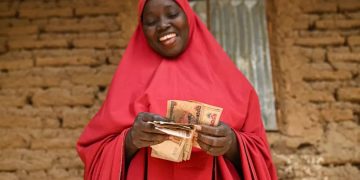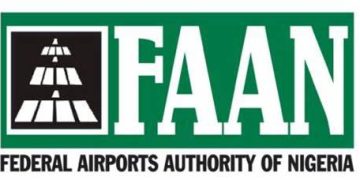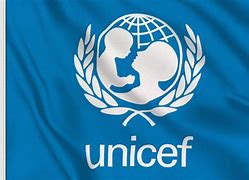A local tailor who did some farming on the side, Ibrahim relocated his family to Girgir in 2022 to escape incessant attacks from Non-State Armed Groups (NSAGs) in Geidam Local Government. Left with no ancestral farmland, the father of nine took up tailoring to support his growing family.
Since the death of Ibrahim Tella Tallatu last year, his wife, Nafisa has tried to put more efforts in her small business.
“Life has been difficult for us since his death. He was a tailor, and we have nine children between us. We didn’t have much, but he always tried his best so that we would not go to bed hungry. His death left a huge vacuum in our family,” recalls Nafisa.
One photograph has a pride of place in the mud apartment where Nafisa Abdullahi and her nine children live in Girgir, a small community in northeast Nigeria.
It is that of Ibrahim Tella Tallatu, her husband who died after a brief illness last year. Hauwa, the baby of the house was only a few weeks old at the time of the incident. In the picture, Ibrahim, a tailor, sits behind his sewing machine, pedaling away to transform a fabric into an outfit.
Nafisa says it is the last picture of her husband and one she is keeping for Hauwa, their last child.
“I want her to know that her father was hardworking and responsible. I want her to know his name and his face,’’ says Nafisa
“My husband’s death was not what anyone could have predicted. He was a young man, and I was already selling Awara (local cheese) before he died. It was a small business that I did just to support my husband. But with nine children, including a baby, I had to increase the quantity of the Awara so I could sell more after his death.”
“However, there was no capital. My husband left no money behind and I had no savings. It was a struggle to increase the production of Awara with limited capital investment. I was afraid to borrow because it could become a huge problem. In the end, I had to start knitting caps so that my children and I could feed,” she adds.
A timely cash transfer programme initiated by UNICEF and generously funded by the UK’s Foreign, Commonwealth and Development Office (FCDO) came to Nafisa’s rescue. Aimed at preventing malnutrition in the region by providing financial assistance to vulnerable families like Nafisa’s, the project offers vulnerable families with N15,000 as cash transfer so that families can buy nutritious food for their children and jumpstart their livelihood again.
The programme designed as an emergency response component of the Multisectoral Integrated Nutrition Action (MINA) project funded by FCDO provides immediate and holistic solution to malnutrition pandemic in northeast Nigeria.
Protracted conflict and insecurity in northeast Nigeria have continued to inflict hardship on families, impacting the ability of households to produce food on their farmlands and restart their livelihood. The dire situation has left hundreds of thousands of women and children in the region at an increased risk of acute malnutrition and food insecurity.
According to a UNICEF report, over 460,000 children were treated for severe malnutrition in Borno, Yobe and Adamawa in 2023, compared to around 337,000 children treated for same in the preceding year. This is a 37 percent increase from 2022!
The cash transfer initiative aims to treat the problem from the root, by helping the most indigent families improve their access to dietary options and provide livelihood support to sustain the change.
“When I got the cash, I bought soup ingredients and moderate quantities of millet, rice and vegetables. I bought sandal for one of my children and invested the rest of the money to buy materials for my Awara business. The cash made a difference and I continue to knit and sell handwoven children’s hats and sweaters,’’ Nafisa says.
Story by UNICEF’s Communication Officer, Folashade Adebayo.
























